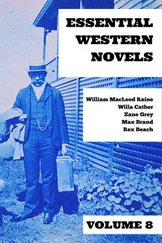They trot through the streets at a merry pace, down past the Harborough Hotel, over the railway, away on by Wicklow Lodge, towards Burton Lazarus. It is a beautiful morning, and the sun is shining brightly on the flats that lie below. Dalby Hall, nestling amidst its woods on the far hillside, stands out distinct and clear, with the same bright sun gleaming on its gables and windows.
“What a glorious morning, Jack!” exclaims Lady Flora enthusiastically. “Why, it’s like summer, is it not?”
The others are a little on ahead, and these two have fallen in the rear. Jack looks at the speaker with a smile.
“It is a grand day, Florrie, and it suits you, too. I never saw you looking better in my life.”
She flushes up. Florrie Desmond does not care about compliments,—she values them at their worth,—but she and Jack are fast friends, and she is not quite averse to them from him. She answers, however.
“Shut up, you goose, and don’t talk nonsense.”
She is a clever woman is Flora Desmond, cleverer far than some people take her to be. Her bringing up has not been exactly like other women’s, and she has always kicked against the restraints and restrictions put upon her sex. She is the daughter of the Marquis and Marchioness of Douglasdale, and an orphan, having lost her father at an early age. Lady Douglasdale was, in her day, a very beautiful woman, a persona grata at Court, where her husband exercised the duties of Comptroller of the Household, and was a favourite with his sovereign; but after the marquis’s death she took greatly to travelling, and thus it was that Flora Ruglen, in conjunction with her twin brother Archie, saw most of the great world of Europe before she was ten years of age.
Travelling expands the mind, and brightens the senses. It had this effect upon the girl, forming much of her character before its time. At that early age she exhibited peculiar characteristics. No one could get her to settle down to study under a governess; she loathed the sight of school books, and led her unfortunate preceptors a sad life; yet, in strange contradiction to so much wilfulness and apparent indolence, she was seldom without the companionship of a book in her play hours, and when not otherwise engaged with her brother, would invariably be found poring over these books, thirstily seeking knowledge, or committing to paper, in powerful language for one so young, the impressions of her youthful brain.
She had dreams had Flora Ruglen—dreams of a bright future, an adventurous career. The time had not arrived when the road which she and her twin brother had been pursuing, would branch off in different directions, his leading forth to opportunities of power, fame, and glory, hers along a lane, narrow and cramped, and with nothing to seek at the end, save that against which her bright independent spirit rebelled and revolted. But it came at last, when the companion of her happy childhood’s days was taken from her, when Archie was sent to school, and she was left alone. It came upon her with a suddenness which she found difficult to realise, and the blow was terrible. To describe what she suffered would be well-nigh impossible. Only those who by experience have learnt it, could be brought to understand the horror of her position. But Flora Ruglen, having faced it, brought all the courage of her nature to support it, though from that moment she became utterly changed.
She had no one in whom to confide; neither her mother nor any one else would have understood her. With girls of her own age she had nothing in common, and they looked on her with awe as a proud, stuck-up being. None could guess at the warm heart that beat beneath Flora Ruglen’s apparently cold and reserved demeanour—except one, and that one was a boy of about her own age.
She had made his acquaintance during the holidays, when Archie, home from school, had invited his “best pal” to spend them at Ruglen Manor, the beautiful dower property of Lady Douglasdale. It was with young Lord Estcourt that Archie Douglasdale had struck up so keen a friendship. The lads had been “new boys” at Eton together, and in the first strangeness of introduction to that boy’s world had been thrown into each other’s company a good deal, being in the same house, and, as in Flora’s case, much of the same age.
When Estcourt came to Ruglen Manor Flora Ruglen was about seventeen years of age. She was interested in her brother’s friend, inasmuch as he had lately lost his mother, and was an orphan. It did not take long for a firm friendship to spring up between the boy and girl. Nigel Estcourt was an only child, had never known what it was to have brothers and sisters, and was ready to look upon Flora in that light gladly enough. He and she were a great deal in each other’s company, and for the first time in her life she unloosed the cords of her heart, and told him of the trouble that had descended upon her life.
He sympathised with her did young Nigel. How could he help it, being, as he was, the friend of Hector D’Estrange? That extraordinary boy had risen to be head of the school. None could equal him at Eton, and his name had gone forth beyond the portals of the college as the coming man of his day. The article in the Free Review, which had first brought his name into prominence in the year 1890, had created a good deal of discussion in many circles. Of course it had been vigorously attacked. What great stroke aimed at Justice and Freedom but has ever been so opposed, hounded down, and decried? But truth is like a bright sun which no mortal power can dim. It may be clouded for a time, but it must shine forth and ultimately prevail.
He had left Eton, gone to Oxford, and had there taken high honours. He no sooner made his appearance in the world of fashion, politics, and letters, than he was received and courted everywhere. Never before had a youth risen so rapidly in the scale of success. He was undoubtedly the idol of his day, and in 1894 only twenty-one. It was extraordinary. Hector D’Estrange would marvel often at it himself. He had gone out into the world in what was mere childhood, prepared to combat with the many difficulties which he knew must beset his path. He was over modest was this boy. He had not sufficiently estimated his great and surpassing genius, but it had shone forth, been recognised and approved of, because he was a man.
To return to Flora Ruglen. At the age of eighteen she lost her mother, and the guardianship of the girl devolved on her aunt, a giddy, worldly woman, the late marquis’s sister, and Countess of Dunderfield. No two women could have been more diametrically opposite then these two, no two characters more unlike. Briefly, and to cut the matter short, Lady Dunderfield insisted on taking Flora into Society, and set herself to bring about a match between the high-souled, high-spirited girl, and the Duke of Dovetail, a rich old monstrosity, whose rent-roll was nigh on a million, and whose body was afflicted by almost every disease under the sun.
Had the girl been in a position to map out her own line of life, what a different tale might now be told! She was not. The law denied her the right to choose her future; it curtailed her line of action within certain bounds. What could she do? The odds were against her, and she sought refuge through the first outlet that presented itself.
This outlet was in the shape of a young baronet, a youth of twenty-one. He thought himself very much in love with Lady Flora Ruglen. He proposed, and she accepted him. Lady Dunderfield forbade Sir Reginald Desmond the house. The young people took French leave of her, fled to Scotland, and were married, and Lady Dunderfield, green with disappointment and rage, had to accept the fact. This is how Flora Ruglen became Lady Flora Desmond. Had she erred in the step she took? Perhaps so. What other alternative had she? Had the law permitted her to go out into the world and adopt the profession of her choice, there is little doubt that ere this Flora Ruglen would have made a great name for good.
Читать дальше












